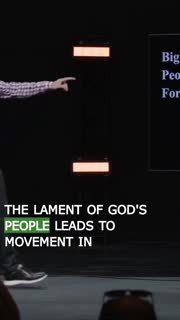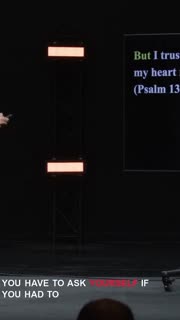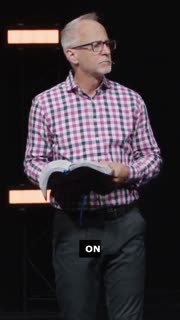Finding Hope Through Honest Lament in Faith
Devotional
Sermon Summary
Bible Study Guide
Sermon Clips
1. "The Bible is an honest book. It doesn't deny these tragedies. It doesn't deny that there are moments when the sovereignty of God intersects with the reality of life and it is horrible. The book of Psalms doesn't deny it. Two thirds of this incredible catalog of music that explains the true reality of life in its fullest expression and what it means to be a human being with human experiences. Two thirds, two thirds of the 150 books are laments." [32:29] (40 seconds)
2. "The moments are harsh and brutal. But you'll hear today so too does our response need to be. That God can handle visceral language. That God can handle a violent approach of his people who charge his throne because we do know him. We know, we have tasted orientation. We've declared that when all seems right it's because of him." [34:10] (30 seconds)
3. "You sing a very different song but you sing it to the same God. And what we will see today in the 22nd and predominantly the 13th Psalm and I'll give you a few other illustrations is that there's something powerful about the structure of these laments. That's what they are. Just this guttural visceral crying out to God. Where you're not only questioning what happened, you're questioning why He allowed it." [35:16] (33 seconds)
4. "There is so much pain and if you and I simply feel like I can't cry out in this situation because it's not as bad as that situation then what you will do is deny yourself deliverance, spiritual deliverance in a situation and what you'll not do is train yourself for that moment we know is coming. It is coming. You will be the one who suffers the loss of a loved one. Because nobody gets out alive." [36:24] (32 seconds)
5. "The lament of God's people leads to movement in this is the first key don't forget that movement in then movement for movement in movement for here we go how long Lord just as the Lord's prayer it starts with an acknowledgement of the relationship remember last week we talked how critical it is that you never forget that you have the right to call him our God no one is like our God it's a possessive term not no one is like the God although that's true there is something rich." [44:08] (36 seconds)
6. "Somewhere along the line you gotta have the courage to complain you really do if we don't get this out of us it's going to continue to poison us and that is the exact opposite of what needs to happen is in order for that movement to happen we've got to get honest with God about what's going these songs are written to God and they're written for others so that we can learn them it's not about running around and telling all your friends you go to God with this." [54:49] (40 seconds)
7. "The lament of God's people honestly addresses God about the situation you're in and his inaction gosh can you imagine calling 911 because your house is on fire and 30 minutes later they're still not there you call and say hey listen it's no longer the garage now my kitchen's engulfed okay we're coming hour later you call back dude the entire house I know we're coming you're like this is not how fire departments respond how would you what would you do at that moment you'd lose your ever loving mind wouldn't you." [58:23] (40 seconds)
8. "You have to ask yourself if you had to choose between two movements one being the movement of God to intervene in your circumstances or the movement of God to intervene in your consciousness which do you prefer do you want God to change your situation and leave you frustrated emotionally sick incapable of adjusting or would you rather if you had to choose and I'm not saying you do praise God you don't but would you prefer to be at peace or have different situations." [01:11:14] (45 seconds)
9. "Every time we write a song about what we're going through we express confidence Walter Brueggemann so beautifully said until we sing it it's not real it's when we start singing the lament that we give life to it so that God can do something about it such a beautiful thought I will sing the Lord's praise how do you get there from well I don't know I will give thanks in the great assembly among the throng shall I praise you." [01:14:28] (40 seconds)
10. "On that painful, painful Thursday night when Christ is in the garden, it's really the beginning of that incredible season of it be thou will, remove this cup from me. Yet not I will, my will be done but thou. So excruciating, it was literally sweat and blood. But by the next morning, they have, found him guilty on trumped up charges. They have stripped his clothes from him and they've begun to beat him. They're beating him over the head with a club repeatedly." [01:19:50] (39 seconds)
Ask a question about this sermon
2. "The moments are harsh and brutal. But you'll hear today so too does our response need to be. That God can handle visceral language. That God can handle a violent approach of his people who charge his throne because we do know him. We know, we have tasted orientation. We've declared that when all seems right it's because of him." [34:10] (30 seconds)
3. "You sing a very different song but you sing it to the same God. And what we will see today in the 22nd and predominantly the 13th Psalm and I'll give you a few other illustrations is that there's something powerful about the structure of these laments. That's what they are. Just this guttural visceral crying out to God. Where you're not only questioning what happened, you're questioning why He allowed it." [35:16] (33 seconds)
4. "There is so much pain and if you and I simply feel like I can't cry out in this situation because it's not as bad as that situation then what you will do is deny yourself deliverance, spiritual deliverance in a situation and what you'll not do is train yourself for that moment we know is coming. It is coming. You will be the one who suffers the loss of a loved one. Because nobody gets out alive." [36:24] (32 seconds)
5. "The lament of God's people leads to movement in this is the first key don't forget that movement in then movement for movement in movement for here we go how long Lord just as the Lord's prayer it starts with an acknowledgement of the relationship remember last week we talked how critical it is that you never forget that you have the right to call him our God no one is like our God it's a possessive term not no one is like the God although that's true there is something rich." [44:08] (36 seconds)
6. "Somewhere along the line you gotta have the courage to complain you really do if we don't get this out of us it's going to continue to poison us and that is the exact opposite of what needs to happen is in order for that movement to happen we've got to get honest with God about what's going these songs are written to God and they're written for others so that we can learn them it's not about running around and telling all your friends you go to God with this." [54:49] (40 seconds)
7. "The lament of God's people honestly addresses God about the situation you're in and his inaction gosh can you imagine calling 911 because your house is on fire and 30 minutes later they're still not there you call and say hey listen it's no longer the garage now my kitchen's engulfed okay we're coming hour later you call back dude the entire house I know we're coming you're like this is not how fire departments respond how would you what would you do at that moment you'd lose your ever loving mind wouldn't you." [58:23] (40 seconds)
8. "You have to ask yourself if you had to choose between two movements one being the movement of God to intervene in your circumstances or the movement of God to intervene in your consciousness which do you prefer do you want God to change your situation and leave you frustrated emotionally sick incapable of adjusting or would you rather if you had to choose and I'm not saying you do praise God you don't but would you prefer to be at peace or have different situations." [01:11:14] (45 seconds)
9. "Every time we write a song about what we're going through we express confidence Walter Brueggemann so beautifully said until we sing it it's not real it's when we start singing the lament that we give life to it so that God can do something about it such a beautiful thought I will sing the Lord's praise how do you get there from well I don't know I will give thanks in the great assembly among the throng shall I praise you." [01:14:28] (40 seconds)
10. "On that painful, painful Thursday night when Christ is in the garden, it's really the beginning of that incredible season of it be thou will, remove this cup from me. Yet not I will, my will be done but thou. So excruciating, it was literally sweat and blood. But by the next morning, they have, found him guilty on trumped up charges. They have stripped his clothes from him and they've begun to beat him. They're beating him over the head with a club repeatedly." [01:19:50] (39 seconds)










